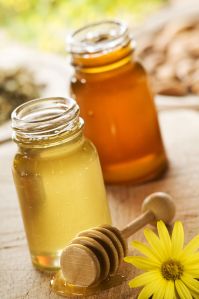 Honey is one of my favorite ingredients. It’s truly a worker bee in the world of skin care and cooking. I love to sip hot lemon water with a tablespoon of organic honey. Honey can be used as an alternative to sugar in many recipes. Unlike most sweetners, honey also contains small amounts of vitamins, minerals, amino acids and antioxidants. The other day, a client asked me why I like honey as a skin care ingredient.
Honey is one of my favorite ingredients. It’s truly a worker bee in the world of skin care and cooking. I love to sip hot lemon water with a tablespoon of organic honey. Honey can be used as an alternative to sugar in many recipes. Unlike most sweetners, honey also contains small amounts of vitamins, minerals, amino acids and antioxidants. The other day, a client asked me why I like honey as a skin care ingredient.
I incorporate honey into our ILLUSTRE ESSENZA® Brightening & Soothing Toner for its natural “humectant”, antibacterial and antioxidant properties. Honey has a hygroscopic nature, which means when exposed to air, it naturally absorbs moisture in from the air. When used in skin treatments, honey traps and seals in the moisture leaving skin soft and supple. Honey has an interesting story to tell.
There are more than 25,000 different species of honey bees in the world. We have over 3500 in the US. While there are 3 types of bees that make up a honey bee colony, workers (females) account for 99%, drones (males) and the queen bee make up the balance. The average worker bee only lives 45 days during the summer months. I always wondered where the term, “worker bee” came from. I guess it literally means you don’t have alot of time to get the job done!
Honey comes in over 300 varieties just in the United States alone! Honey can differ greatly in antimicrobial potency-sometimes as much as 100%! Honey is “manufactured” in one of the world’s most efficient factories, the beehive. Believe it or not -bees may travel as far as 55,000 miles and visit more than two million flowers to gather enough nectar to make just a pound of honey. (And you thought your workload and commute was bad!) It is reported that honey from the Manuka bush, which grown in New Zealand, has some of the highest potency for anti-microbial properties.
Honey also provides antibacterial properties. Researchers began to document the healing properties of honey in the early part of the 20th century. Research all but stopped with the development of antibiotics, however recently the development of resistance to antibiotics has led to a new interest into the healing properties of honey. The antimicrobial agents in honey help prevent the growth of certain bacteria. Honey contains an enzyme that produces hydrogen peroxide which is thought to be the primary reason for the antimicrobial properties of honey. Honey can also be utilized as a natural treatment for wounds like cuts and abrasions and has been been used to cover scalds so that bacteria is less likely to enter the wound and honey can help promote wound healing.
Honey has also been shown to help manage acne by attacking the bacteria that cause the outbreaks P. acnes ( Propionibacterium acnes) and help keep the skin moisturized which aids in rejuvenation and healing. Another reason we use honey in our ILLUSTRE ESSENZA® Brightenng & Soothing Toner.
Honey is also a powerful antioxidant containing natural properties. Antioxidants counter the degenerating activity process whereby fats in food react with oxygen and cause the development of free radicals that are harmful to the body. Darker colored honeys seem to possess more antioxidants that light-color varieties. The darker honeys also seem to have a more pronouced flavor. Honey helps to eliminate free radicals in the body, and also assist nutritionally in the growth of new tissue. Honey is becoming more popular as a vital ingredient used in skin care products which can help protect, rejuvenate and restore a younger looking skin.
Of course, there are many individuals with allergies to the stings of Apis Mellifera (Honey Bees). These social insects do not normally attack people, but will sting them only in self defense if disturbed (the African honey bee is however rather aggressive). Once stung, if the stinger remains in the skin, a Honey bee is responsible, while if no stinger is present, a Wasp is likely to be the culprit. The female worker honey bee carries the stinger and dies soon after discharging a sting. If you are allergic and know it, (less than 1 out of 100 are allergic) carry a bee sting kit prescribed by your doctor. A website I found that has some useful tips for dealing with bee stings is the Texas A & M University, Department of Entomology at http://honeybee.tamu.edu/bees_in_society/stings.html
For more information about the sweet magical qualities of honey, benefits, recipes or sources to purchase visit www.honey.com Next time you see a bee hovering in your garden, you might have a renewed respect for another hard working commuter-who is truly one of the smallest and most productive members of society!
To your health-
Pam Tirado, President, Product Developer ILLUSTRE ESSENZA®
Source: Three Key Valuable Honey Properties-www.benefits of honey.com; National Honey Board-www.nationalhoneyboard.co;www.honeybee.tamu.edu
